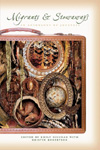




 |
 |
Swept Away
Journeys of the mind, heart and body
by Jeanne McDonald
“I never travel without my diary,” said Oscar Wilde. “One should always have something sensational to read in the train.”
Wilde was widely known for his high drama and egotism, but the idea of reading one’s own work on a journey seems inordinately reductive. We need all of our senses free to absorb the sights, sounds, smells and ambiance of a new place, because any one of those elements can later take us back to a former journey when, for example, we hear bells chiming, smell a redolent cheese in a marketplace, or observe the subtle patina of an aged fountain in a park or garden.
A new collection of essays, stories, photographs and poems published by the Knoxville Writers’ Guild and edited by Emily Dziuban with Kristin Robertson includes work by 67 authors,  some Knoxvillians, others from across the country. Migrants and Stowaways: An Anthology of Journeys ($14.95) was baptized with inspiration from an intriguing collage by artist Melydna Whetsel called My Fiftieth Year. “The cover art,” writes Robertson, “captures both the literal and metaphorical journey, incorporating passages of time, physical aging, birth, death, and of course, sojourns through real and mythical lands and seas.” The artist herself writes, “Life, like art, is composed of layers.... Images ripple to the surface, others fade, some are buried. When...the canvas is laid out before us, we see and reflect and possibly understand. And then we begin again.” some Knoxvillians, others from across the country. Migrants and Stowaways: An Anthology of Journeys ($14.95) was baptized with inspiration from an intriguing collage by artist Melydna Whetsel called My Fiftieth Year. “The cover art,” writes Robertson, “captures both the literal and metaphorical journey, incorporating passages of time, physical aging, birth, death, and of course, sojourns through real and mythical lands and seas.” The artist herself writes, “Life, like art, is composed of layers.... Images ripple to the surface, others fade, some are buried. When...the canvas is laid out before us, we see and reflect and possibly understand. And then we begin again.”
The artist’s journey, of course, is her passage through life thus far, which emphasizes that we don’t need to board a plane, train, or cruise ship to travel. We can be migrants in our own neighborhoods; we can be stowaways, voyeurs to other people’s journeys, through books or overheard conversations, or, as writers, by gleaning scenes and dialogue from distant corners of our own minds.
Even Dziuban’s introduction to this book, told in the seldom-heard second person point of view, takes us on a trip with her: “Fly to Costa Rica. Hire a tourist bus to drive you to the Eco-Lodge near Coter Lake. Don’t fall asleep on the way. Check in. Hire a guide. Begin on the path embedded in the Three Days Plant. On the path, don’t touch anything.... Don’t reach out for an impossibly beautiful bud. You are in the rainforest where poison abounds.”
The first story, “One Last Espresso,” by Pamela Schoenewaldt, was originally produced as a one-act play in Italian at Teatro Cilea in Naples. Whether the reader sees it as a dream or an out-of-body experience doesn’t matter, because either way, the story is stunning and disturbingly memorable. “My mother died in Texas just before noon,” she begins. “...But she came to see me late that night and we drank coffee together, not big, companionable American mugs, just straight shots of espresso. Still, we nearly had our miracle.”
Lisa Swanstrom, a doctoral candidate in literature at the University of California in Santa Barbara, writes about family in “Palindrome,” which means a word or phrase that is the same read forward or backward: “A man, a plan, a canal–Panama.” Visiting relatives in Panama, she begins to understand the ironies in her mother’s spiritual position—half-witch, half-religious fundamentalist. “...I think,” the author muses, “that each of us is a palindrome made of muscle, made of blood, that reaches back to the past, even as we throw out grappling hooks towards the future.”
Religion is also the theme for Jo Ann Pantanizopoulos in her hilarious memoir, “Getting Religion,” in which she embarks on both a physical journey to Thessaloniki, Greece, and a spiritual one, when she must convert from Baptist to Greek Orthodox in order to marry her beloved fiancee, Yanni. While enduring a lengthy lecture on catechism from a Greek priest who knows no English, the author whispers to Yanni: “How much longer? I love your eyes,” which Yanni translates to the priest as “Father, she wants to know if there is more than one path to heaven.”
Knoxville attorney Julie Auer’s piece, “A Letter to Mabel Dodge,” is ingenious in its literary and historical references: “I want to be a traitor to the false values of complacency and vanity. I want to sit in the sweaty, sun-baked studio of O’Keefe, or in the lumpy merry lap of Stein, right in Alice’s glare.”
Each of these authors has something valuable to contribute: Judy Loest’s whimsical poem about Eve leaving Eden; Donna Doyle’s “Down by the Honey,” where a supermarket clerk’s direction becomes the title of a poem; Emily Dewhirst’s riveting memoir about how she became a nomad; Mark DeKay’s thought-provoking essay on architecture and the environment; Kim Trevathan’s life lessons learned from the river. There is humor here, philosophy, pathos, empathy, and downright joy. Without ever leaving home, you’ll take 87 journeys in Migrants and Stowaways, and each will take you to a place you’ll want to visit again and again.

December 2, 2004 • Vol. 14, No. 49
© 2004 Metro Pulse
|
|